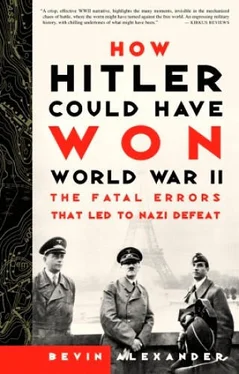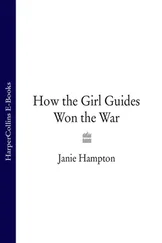The Gibraltar plan—the only idea ever considered was a headlong attack on the heavily fortified rock—now became a leitmotiv that ran through most of the discussions that followed. It was an absurd idea, and shows how unrealistic Hitler was.
The plan required Spanish entry into the war, an extremely dangerous move that would benefit Spain little, yet cause dire and immediate consequences. The British would cut off food imports from Argentina and other American countries Spain depended on, and would seize the Spanish Canary Islands off the northwestern coast of Africa. Franco wanted nothing to do with the plan, yet with the Wehrmacht on his border, he didn’t dare say so.
Aside from Gibraltar, Hitler also came up with other nonsensical ideas that demonstrated a profound lack of appreciation of the strategic possibilities that had opened to him. He waxed hugely enthusiastic about seizing two groups of Portuguese islands, the Azores, in the Atlantic 1,200 miles west of Lisbon, and the Cape Verde Islands, in the south Atlantic 150 miles west of Dakar off the coast of Africa. He also studied capture of the Canaries prior to a Gibraltar attack—with the idea of beating the British to the punch.
In theory, all three island groups would be useful as air and sea bases to break up British convoys that moved regularly through the Atlantic. Hitler’s excitement about the Azores, however, rested mainly on hopes of building long-range bombers that could reach the United States. If he could get these aircraft built and stationed on the Azores, he said, the threat would force the United States to concentrate on its own defense, and help Britain less.
The Atlantic islands idea was more absurd than the Gibraltar plan. Only Admiral Raeder dared to tell Hitler so, and even he couched his objections in discreet terms. The German navy could actually seize the islands in surprise moves, Raeder assured Hitler, but it could not protect the sea lanes to them thereafter. The Royal Navy would erect an iron blockade in days. German garrisons would be cut off from supplies, except driblets that might be flown in. Few attacks on British convoys— much less air attacks on the United States—could be mounted, because the Germans could get little fuel to the islands.
Raeder’s logic was overwhelming and should have ended the matter right there. But it didn’t. Hitler continued to agitate for capture of the Atlantic islands on into the fall and beyond.
Since the army generals had been unable to sway the Fuehrer to carry out a Mediterranean strategy, Admiral Raeder weighed in on September 6 and September 26, 1940. At the second conference Raeder cornered Hitler alone and showed him step by step how Germany could defeat Britain elsewhere than over the English Channel. Doing so would put Germany in a commanding position against the Soviet Union.
Raeder, bowing to Hitler’s passions, said the Germans should take Gibraltar and secure the Canary Islands. But his main concern in that part of the world was the great northwestern bulge of Africa, largely controlled by France.
An imponderable regarding Hitler’s thinking is why, when he was negotiating France’s surrender, he did not demand admission of German troops into French North Africa—Algeria, Tunisia, and Morocco. If the French refused, he could have threatened to occupy all of France and deny the French a government at Vichy. Besides, the French had so few troops in North Africa they couldn’t have prevented a German occupation.
The importance of the region was forced upon him only three days before the September 26 conference: a joint operation of British and Free French forces under Charles de Gaulle had tried to seize Dakar, but had been beaten off by Vichy French guns. This reinforced Raeder’s conviction that the British, supported by the United States, would try to get a foothold in northwest Africa in order to move against the Axis. He urged Germany to team up with Vichy France to secure the region.
But Raeder’s main argument was that the Axis should capture the Suez Canal. After Suez, German panzers could advance quickly through Palestine and Syria as far as Turkey.
“If we reach that point, Turkey will be in our power,” Raeder emphasized. “The Russian problem will then appear in a different light. It is doubtful whether an advance against Russia from the north [that is, Poland and Romania] will be necessary.”
No one realized this truth better than Winston Churchill. In a message to President Roosevelt a few months later, he asserted that if Egypt and the Middle East were lost, continuation of the war “would be a hard, long, and bleak proposition,” even if the United States entered.
But Adolf Hitler had a much more difficult time seeing what was clear to Churchill. According to Raeder, Hitler agreed with his “general trend of thought” but had to talk things over with Mussolini, Franco, and Pétain. This shows Hitler was seeking limited tactical gains in the Mediterranean. Although a drive through Suez would call for an agreement with Mussolini, it would not require concurrence of Franco or Pétain. This indicates Hitler did not grasp that the victory over France had transformed the entire strategic outlook for Germany.
Raeder felt the senior army generals had a “purely continental outlook,” did not understand the war-winning opportunities that had opened up on the south shore of the Mediterranean, and would never counsel Hitler correctly. Although the OKH, the army high command, and the OKW, the armed forces high command, did advise Hitler to send troops to North Africa, their proposals lacked Raeder’s urgency. Never did Brauchitsch, Halder, Jodl, or Field Marshal Wilhelm Keitel, chief of staff of the OKW, express the conviction that the war could be won in the Mediterranean, although Keitel told Benito Mussolini that capture of Cairo was more important than capture of London. Part of their hesitancy lay in the knowledge that Hitler had been fixed for a long time on destroying the Soviet Union and gaining Lebensraum in the east. Their careers depended upon not rocking that boat. However, they never stressed to Hitler, as did Raeder, that victory in the Mediterranean would make it easier to achieve victory over the Soviet Union.
Once Axis forces overran Egypt and the Suez Canal, they would close the eastern Mediterranean to the Royal Navy. The British fleet would immediately retreat into the Red Sea, because it could not be adequately supplied by convoys through the western Mediterranean. Whether or not the Germans seized Gibraltar, Britain would be strategically paralyzed.
The Axis would be able to move at will into the Middle East, for the British had no substantial forces there. This region produced much of the world’s oil, and its capture would provide ample amounts of Germany’s single most-needed strategic material.
An advance on the southern frontier of Turkey would put the Turks in an impossible position. Hitler was already gaining Hungary, Romania, and Bulgaria as allies. Therefore, Turkey could be approached both by way of Bulgaria at Istanbul and from northern Iraq and Syria. Turkey would be forced to join the Axis or grant passage for Axis forces and supplies. A defiant stance would result in the swift defeat of the Turkish army and disaster.
Passage through Turkey would reduce the importance of Malta and Gibraltar. This way, both could be eliminated without the active support of Franco and without direct assault.
German forces could occupy French North Africa with or without Vichy France’s cooperation. From French Morocco, they could approach from the south the small strip of Morocco along the Strait of Gibraltar ruled by Spain. Spain would be forced to grant transit rights, or stand aside if German forces occupied the strip without permission. Spain could not resist for fear of a German attack into the heart of Spain from France. Consequently, German airfields and batteries could be set up along the south shore of the strait. This would close it to Britain—without an expensive military assault on the rock of Gibraltar.
Читать дальше


![Джонатан Димблби - Barbarossa - How Hitler Lost the War [calibre]](/books/385421/dzhonatan-dimblbi-barbarossa-how-hitler-lost-the-w-thumb.webp)









